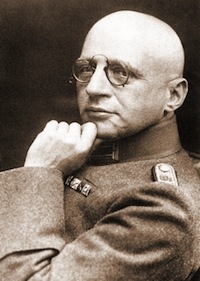Fritz Haber, the fixation of nitrogen, and the "poison gases" of World War I: Morality in science?
Prof. Joseph Gal (University of Colorado School of Medicine, Denver, CO, USA)
Ontvangst: 19 u
Lezing: 19u30 -21u30 met pauze
The Nobel laureate German chemist Fritz Haber (1868-1934) achieved in 1910 his first great success: the fixation of nitrogen, an immensely beneficial invention in that it provides unlimited quantities of nitrogen fertilizer for food production. But the fixation of nitrogen also provides unlimited quantities of nitrates for the production of explosives and allowed Germany to prosecute World War I for more than four years. During the war Haber led the development of 'poison gases' and had no moral qualms about their use in war. However, some scientists, e.g., Max Born and Ernest Rutherford, made a different choice: they refused to participate in chemical warfare development. Haber was also blind to the realities of his society, with tragic personal consequences. He was a brilliant chemist with great scientific accomplishments, but his story raises grave and complex questions of morality in science.
Professor Joseph Gal is an authority on historical lectures about great scientists and a passionate and vivid speaker on these topics
Deze unieke lezing is gratis voor KVCV-leden. Niet-leden betalen EUR 2,5 op de avond zelf.

